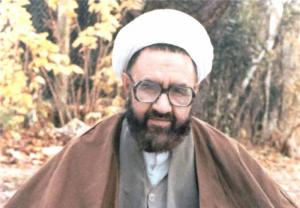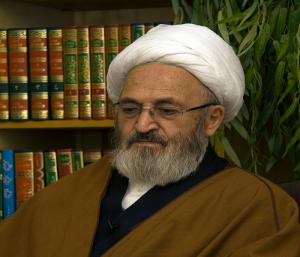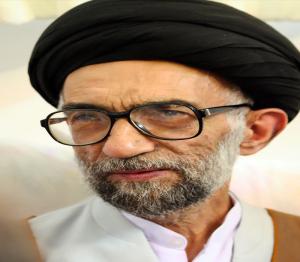Various Articles
Do we have the right to ask about the Logic behind Islamic Laws?
- Published at
-
- Author:
- Nasir Makarem Shirazi

Now we discuss the most important topics about Islamic laws, its rules and regulations and their philosophy and most of the questions and answers are based on this. “Why should we pray Prayers is the question every person asks himself? Why should a person go for the pilgrimage of House of Allah? Why it is forbidden to take interest in Islam? What is the philosophy for prohibiting pork? Why is polygamy allowed in Islam? Why it is prohibited to eat in gold and silver utensils? etc…etc…
Thankfulness (Shukr)
- Published at
-
- Author:
- Imam Khomeini
 Through my continuous sanad going back to the proof of the sect and its leader, Muhammad ibn Ya’qub al-Kulayni (Q) from Humayd ibn Ziyad, from al-Hasan ibn Muhammad ibn Sama’ah, from Wuhayb ibn Hafs, from Abu Bash, from Abu Ja’far (A) that he said: One night that the Messenger of Allah (S) was with ‘A’ishah, she said to him, “O Messenger of Allah, why do you exhaust yourself when God has forgiven you your former and latter sins?” The Prophet (S) replied, “O ‘A’ishah, shouldn’t I be a grateful servant?” The Imam (A) added: The Messenger of Allah (S) used to stand on the toes of his feet (in prayer in the night) and so God, the Glorious and the Exalted, sent down the verse: “Taha. We have not sent down the Qur’an upon thee to cause thee hardship. (20:1)”
Through my continuous sanad going back to the proof of the sect and its leader, Muhammad ibn Ya’qub al-Kulayni (Q) from Humayd ibn Ziyad, from al-Hasan ibn Muhammad ibn Sama’ah, from Wuhayb ibn Hafs, from Abu Bash, from Abu Ja’far (A) that he said: One night that the Messenger of Allah (S) was with ‘A’ishah, she said to him, “O Messenger of Allah, why do you exhaust yourself when God has forgiven you your former and latter sins?” The Prophet (S) replied, “O ‘A’ishah, shouldn’t I be a grateful servant?” The Imam (A) added: The Messenger of Allah (S) used to stand on the toes of his feet (in prayer in the night) and so God, the Glorious and the Exalted, sent down the verse: “Taha. We have not sent down the Qur’an upon thee to cause thee hardship. (20:1)”
Beliefs Between Reason and Sentiment
- Published at
-
- Author:
- Ayatullah Muhammad Taqi Modaressi
- Source:
- www.imamreza.net
 In the Name of Allah the most Gracious the Most Merciful
And We sent not before you any messenger, but surely they ate food, and went in the markets; and we have appointed some of you to be a trail for others. Will you endure? Your Lord is ever All-seeing.
In the Name of Allah the most Gracious the Most Merciful
And We sent not before you any messenger, but surely they ate food, and went in the markets; and we have appointed some of you to be a trail for others. Will you endure? Your Lord is ever All-seeing.
The Marvels of the Eyes and Tongue
- Published at
-
- Author:
- Imam Reza Network
 Usually the eyes are compared with the camera with has delicate lenses that take pictures of various scenes. The pictures reflect like a movie in the eye channel and from there with the help of sight nerves transfers to the brain. This apparatus of taking the photographs which is very much fine and accurate, in the entire period of day and night may do the photography from the different scenes but in many ways it cannot be compared with the most sophisticated and advanced movie cameras as:
Usually the eyes are compared with the camera with has delicate lenses that take pictures of various scenes. The pictures reflect like a movie in the eye channel and from there with the help of sight nerves transfers to the brain. This apparatus of taking the photographs which is very much fine and accurate, in the entire period of day and night may do the photography from the different scenes but in many ways it cannot be compared with the most sophisticated and advanced movie cameras as:
The Causes of Worry and Anxiety
- Published at
-
- Author:
- Ayatullah Nasir Makarim Shirazi
 1. Sometimes, distress and anxiety are related to a dark and uncertain future which lie ahead of a person and manifest itself to him. The possibility of blessings leaving a person, falling into the grip of the enemies, weakness, sickness, inability to work, desperation and his need of others all result in a person being put through mental trauma.
1. Sometimes, distress and anxiety are related to a dark and uncertain future which lie ahead of a person and manifest itself to him. The possibility of blessings leaving a person, falling into the grip of the enemies, weakness, sickness, inability to work, desperation and his need of others all result in a person being put through mental trauma.
Three Important and Fate Deciding Traits in the Life of a Person
- Published at
-
- Author:
- Ayatullah Nasir Makarim Shirazi
 The Prophet Muhammad (S) has said, “O' ‘Ali! If the following three traits are not found within a person, then his actions shall not be complete: Wara’ which prevents him from committing transgressions against Allah, the Noble and Grand; noble moral traits through which he acts with tolerance with the people; and forbearance through which he repels the ignorance of the ignorant person.”
The Prophet Muhammad (S) has said, “O' ‘Ali! If the following three traits are not found within a person, then his actions shall not be complete: Wara’ which prevents him from committing transgressions against Allah, the Noble and Grand; noble moral traits through which he acts with tolerance with the people; and forbearance through which he repels the ignorance of the ignorant person.”
Satanic Insinuation
- Published at
-
- Author:
- Ayatullah Imam Khomeini
 Through my continuous chain of transmitters reaching up to the shaykh of the traditionists and the best of them, Muhammad ibn Ya’qub al-Kulayni (M) who reports from Muhammad ibn Yahya, from Ahmad ibn Muhammad, from Ibn Mahbub, from ‘Abd Allah ibn Sinan, who said: I mentioned to Abu ‘Abd Allah (A) a man who was troubled by waswas in his wudu, and salat, adding that he is a man of intelligence. Thereupon Abu ‘Abd Allah (A) said, “What kind of intelligence has he when he obeys Satan?” I said, “How does he obey Satan?” The Imam replied, “Ask him regarding its cause and he will tell you that it is a work of Satan.”
Through my continuous chain of transmitters reaching up to the shaykh of the traditionists and the best of them, Muhammad ibn Ya’qub al-Kulayni (M) who reports from Muhammad ibn Yahya, from Ahmad ibn Muhammad, from Ibn Mahbub, from ‘Abd Allah ibn Sinan, who said: I mentioned to Abu ‘Abd Allah (A) a man who was troubled by waswas in his wudu, and salat, adding that he is a man of intelligence. Thereupon Abu ‘Abd Allah (A) said, “What kind of intelligence has he when he obeys Satan?” I said, “How does he obey Satan?” The Imam replied, “Ask him regarding its cause and he will tell you that it is a work of Satan.”
The Seekers of Knowledge
- Published at
-
- Author:
- Ayatullah Imam Khomeini
 With my chain of transmission reaching up to the proof of the sect and its authority, Muhammad ibn Ya’qub al-Kulayni (R) from ‘Ali ibn Ibrahim, who reports in a marfu’ (i.e. without mentioning intermediary authorities) tradition from Abu ‘Abd Allah (A) that he said, “The seekers of (sacred) knowledge are of three kinds, so recognize them by their specific qualities and characteristics. One kind of them seeks it for the sake of ignorance and dispute. Another kind seeks it for the sake of domination and deceit. Yet another kind seeks it for the sake of (improving) understanding and intellect.
With my chain of transmission reaching up to the proof of the sect and its authority, Muhammad ibn Ya’qub al-Kulayni (R) from ‘Ali ibn Ibrahim, who reports in a marfu’ (i.e. without mentioning intermediary authorities) tradition from Abu ‘Abd Allah (A) that he said, “The seekers of (sacred) knowledge are of three kinds, so recognize them by their specific qualities and characteristics. One kind of them seeks it for the sake of ignorance and dispute. Another kind seeks it for the sake of domination and deceit. Yet another kind seeks it for the sake of (improving) understanding and intellect.
Prayer And Concentration
- Published at
-
- Author:
- Ayatullah Imam Khomeini
 With my chain of transmitters reaching up to the most venerable shaykh and the trustworthy authority Muhammad ibn Ya’qub al-Kulayni (R) who reports from a group of our companions, from Ahmad ibn Muhammad, from Ibn Mahbub, from ‘Umar ibn Yazid, from Abu ‘Abd Allah (A)that he said, “It is written in the Torah: O son of Man, if you ‘empty’ yourself (i.e. disengage yourself from all other preoccupations to make yourself available) for My worship, I will fill your heart with richness and I will not abandon you to what you seek and long for. And it will be upon Me to close the door of poverty upon you and to fill your heart with awe for Me. And if you don’t ‘empty’ yourself for My worship, I will fill your heart with preoccupation with the world and I will not close upon you the door of poverty and will abandon you to what you seek.”
With my chain of transmitters reaching up to the most venerable shaykh and the trustworthy authority Muhammad ibn Ya’qub al-Kulayni (R) who reports from a group of our companions, from Ahmad ibn Muhammad, from Ibn Mahbub, from ‘Umar ibn Yazid, from Abu ‘Abd Allah (A)that he said, “It is written in the Torah: O son of Man, if you ‘empty’ yourself (i.e. disengage yourself from all other preoccupations to make yourself available) for My worship, I will fill your heart with richness and I will not abandon you to what you seek and long for. And it will be upon Me to close the door of poverty upon you and to fill your heart with awe for Me. And if you don’t ‘empty’ yourself for My worship, I will fill your heart with preoccupation with the world and I will not close upon you the door of poverty and will abandon you to what you seek.”
Qualities of an Ideal Scientist : An Islamic Perspective
- Published at
-
- Author:
- Prof. Dr.Mohsen Reza Hayderi
 Scientists are individuals with several extraordinary qualities. However, these qualities differ among scientists from various disciplines and depend on the nature and type of research a scientist is engaged in. The impact of scientific research is reflected in a society and the entire humanity at large and scientific research can make human life better or even bring a disaster for human beings.
Scientists are individuals with several extraordinary qualities. However, these qualities differ among scientists from various disciplines and depend on the nature and type of research a scientist is engaged in. The impact of scientific research is reflected in a society and the entire humanity at large and scientific research can make human life better or even bring a disaster for human beings.
The Importance of the Islamic Concept of Having Self-restraint (Taqwa)
- Published at
-
- Author:
- Murtada Mutahhari
 “Is he who founds his building on God wariness and [the pursuit of Allah's] pleasure better off or he who founds his building on the brink of a collapsing bank which collapses with him into the fire of hell? And Allah does not guide the wrongdoing lot.” (9:109)
“Is he who founds his building on God wariness and [the pursuit of Allah's] pleasure better off or he who founds his building on the brink of a collapsing bank which collapses with him into the fire of hell? And Allah does not guide the wrongdoing lot.” (9:109)
How Does Prayers Keep a Person Away From Sin?
- Published at
-
- Author:
- Shaykh Nasir Makarim Shirazi & Ayatullah Ja'far Subhani
 Question: According to Qur’an's point of view one of the effects of Prayers is that it keeps one away from sins and unlawful things. Because Qur’an says: And keep up prayer; surely prayer keeps (one) away from indecency and evil…
Question: According to Qur’an's point of view one of the effects of Prayers is that it keeps one away from sins and unlawful things. Because Qur’an says: And keep up prayer; surely prayer keeps (one) away from indecency and evil…
Lying and Hypocrisy
- Published at
-
- Author:
- Sayyid Mujtaba Musavi Lari
 Manners are an essential factor in societies and in the perfection of nations. Manners were born as a part of humanity. No one denies the vital role that manners play in bringing peace, happiness, and felicity, to man’s spirit; nor does anyone doubt their useful and decisive influence in strengthening the fundamentals of the integrity of conduct and thinking on both the social and public levels. Can you find anyone who suffers from honesty and truthfulness and searches for happiness in the shadow of treachery and lying?
Manners are an essential factor in societies and in the perfection of nations. Manners were born as a part of humanity. No one denies the vital role that manners play in bringing peace, happiness, and felicity, to man’s spirit; nor does anyone doubt their useful and decisive influence in strengthening the fundamentals of the integrity of conduct and thinking on both the social and public levels. Can you find anyone who suffers from honesty and truthfulness and searches for happiness in the shadow of treachery and lying?
The Station of the Faithful Before Allah
- Published at
-
- Author:
- Ayatullah Imam Khomeini
 With a chain of authorities reaching up to the Thiqat al-Islam Muhammad ibn Ya’qub at-Kulayni (Q) from several of our companions, from Ahmad ibn Muhammad ibn Khalid, from Isma’il ibn Mihran, from Abu Said al-Qummat, from Aban ibn Taghlib, from Abu Ja’far (A) that he said, “When the Prophet (S) was taken on his [celestial] journey, he said to God:
With a chain of authorities reaching up to the Thiqat al-Islam Muhammad ibn Ya’qub at-Kulayni (Q) from several of our companions, from Ahmad ibn Muhammad ibn Khalid, from Isma’il ibn Mihran, from Abu Said al-Qummat, from Aban ibn Taghlib, from Abu Ja’far (A) that he said, “When the Prophet (S) was taken on his [celestial] journey, he said to God:
We Must Always Go To the Source of the Problem
- Published at
-
- Author:
- Shaykh Nasir Makarim Shirazi
 Imam 'Ali b. Muhammad al-Hadi (as) was a great Imam who lived under some of the hardest conditions and opposition (to his leadership). It was through the use of the military (of the ruling class of that time), that the Imam was forcefully separated from his Shia (followers); and it is because of this, that there are not many traditions narrated from this Imam.
Imam 'Ali b. Muhammad al-Hadi (as) was a great Imam who lived under some of the hardest conditions and opposition (to his leadership). It was through the use of the military (of the ruling class of that time), that the Imam was forcefully separated from his Shia (followers); and it is because of this, that there are not many traditions narrated from this Imam.
Is according to Islam religion separate from politics?
- Published at
-
- Author:
- Sayyid Rida' Husayni Nasab
 Reply: First of all we had better clarify the meaning of “politics” so that its relationship with religion may become clear. There are two interpretations for the word “politics”:
Reply: First of all we had better clarify the meaning of “politics” so that its relationship with religion may become clear. There are two interpretations for the word “politics”:
Why do the Shi‘ah Prostrate on Turbah {Dried Clay}?
- Published at
-
- Author:
- Sayyid Rida' Husayni Nasab
 Reply: Some think that prostration on the earth or turbah taken from the burial site of martyrs is tantamount to worshipping it and consider it a form of polytheism {shirk}.
Reply: Some think that prostration on the earth or turbah taken from the burial site of martyrs is tantamount to worshipping it and consider it a form of polytheism {shirk}.
Which is correct, “wa ‘itrati” {and my progeny}, or “wa sunnati” {and my tradition}?
- Published at
-
- Author:
- Sayyid Rida' Husayni Nasab
 The hadith scholars {muhaddithun} have narrated hadith ath-thaqalayn {Tradition on the Two Weighty Things} in two ways and it has been recorded in the books of hadith. An examination must be made to see which way is correct:
The hadith scholars {muhaddithun} have narrated hadith ath-thaqalayn {Tradition on the Two Weighty Things} in two ways and it has been recorded in the books of hadith. An examination must be made to see which way is correct:
Sporadic Uprisings by Shias
- Published at
-
- Author:
- Ghulam-Husayn Muharrami
 Most of these uprisings were staged without prior organization and based on individual decisions against the tyranny of caliphs and rulers toward the Shi‘ah and ‘Alawis. Mostly reactionary and intransigent in nature, the most important of these uprisings were the following:
Most of these uprisings were staged without prior organization and based on individual decisions against the tyranny of caliphs and rulers toward the Shi‘ah and ‘Alawis. Mostly reactionary and intransigent in nature, the most important of these uprisings were the following:
The Believer’s Trials And Tribulations
- Published at
-
- Author:
- Sayyid Khomeini
 Muhammad ibn Ya’qub al-Kulayni (R) from ‘Ali ibn Ibrahim, from his father, from Ibn Mahbub, from Abu ‘Abd Allah (A) that he (A) said: “Verily, it is mentioned in the Book of ‘Ali that of all mankind the prophets undergo the severest of trials, and after them the awsiya’, and after them the elect to the extent of their nobility. Indeed, the believer undergoes trial in proportion to his good deeds. So one whose faith is sound and whose deeds are good, his trials are also more severe. That is indeed because God Almighty did not make this world a place for rewarding the believer and punishing the unbeliever. And one whose faith is feeble and whose (good) deeds are few faces fewer tribulations. Verily, tribulations hasten towards the believer with greater speed than rainwater towards the earth’s depths.”
Muhammad ibn Ya’qub al-Kulayni (R) from ‘Ali ibn Ibrahim, from his father, from Ibn Mahbub, from Abu ‘Abd Allah (A) that he (A) said: “Verily, it is mentioned in the Book of ‘Ali that of all mankind the prophets undergo the severest of trials, and after them the awsiya’, and after them the elect to the extent of their nobility. Indeed, the believer undergoes trial in proportion to his good deeds. So one whose faith is sound and whose deeds are good, his trials are also more severe. That is indeed because God Almighty did not make this world a place for rewarding the believer and punishing the unbeliever. And one whose faith is feeble and whose (good) deeds are few faces fewer tribulations. Verily, tribulations hasten towards the believer with greater speed than rainwater towards the earth’s depths.”


